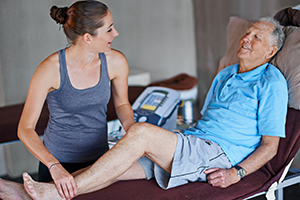
We are always pleased to welcome allied health professionals to our MOOCs and our undergraduate and postgraduate programs. As a physiotherapist, Dr Kate Lawler is passionate about supporting allied health professionals in their quest to develop their expertise in dementia care. Improving knowledge is a good start to improving clinical care. Until now, there has been very little research available to help us understand the dementia knowledge of allied health professionals.
Over the past 12 months Kate and a team from the Wicking Dementia Centre and the Menzies Institute have evaluated data from our Understanding Dementia MOOC to describe the dementia knowledge of allied health professionals. The team included Alex Kitsos and Aidan Bindoff, our data experts, Associate Professor Michele Callisaya a dementia researcher and physiotherapist, Dr Claire Eccleston who helped develop a tool to assess dementia knowledge, and Dr Kathleen Doherty one of our senior research leads at the Wicking Dementia Centre.
Allied health is a tricky term to define – some people say allied health professionals are clinicians who are not doctors and not nurses. That leaves a lot of professions! In the study we undertook, the following allied health ‘therapy’ professions were included:
- Art therapy
- Dietetics
- Exercise physiology
- Music therapy
- Occupational therapy
- Paramedicine
- Physiotherapy
- Podiatry
- Psychology
- Social work
- Speech pathology
In 2018, 4,293 allied health professionals enrolled in our Understanding Dementia MOOC, of whom 1,591 consented to research and completed the Dementia Knowledge Assessment Scale (DKAS) at the beginning of the course.
The results were not surprising – health professionals generally have received less education about dementia than we would hope. Only 13% of this group of allied health professionals achieved a comprehensive dementia knowledge score. Although we assume people enrolling in our courses recognise their need to learn, unfortunately this lack of knowledge is fairly typical of health professionals more broadly.
Areas of weakness included understanding the onset of dementia. Some mistakenly thought dementia symptoms often occur suddenly. The role of allied health in helping support people living with dementia, experiencing behavioural changes, was also poorly understood.
You will be pleased to know that 69% of those who completed the DKAS again after the MOOC achieved a comprehensive score. We have some work to do, but an awareness of the key areas we can focus on in the future is a step in the right direction.
If you are interested in reading more about this study, you might like to read the full journal article published in the Australasian Journal on Ageing: https://onlinelibrary.wiley.com/share/author/KR3XPV7WMDWRF9TASVJN?target=10.1111/ajag.12886
